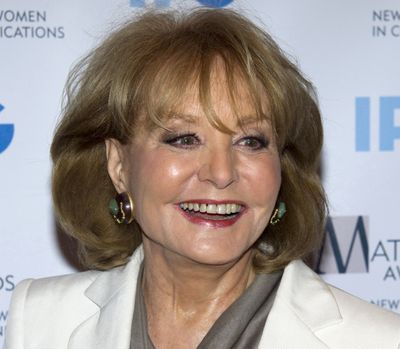Walters’ style changed face of interviews

Let the Barbara Walters farewell tour begin!
Monday’s edition of “The View” opened with the show’s founder and star fixing the camera with that fearless don’t-let-the-strange-absence- of-wrinkles-fool-you-I’ve-been- on-television-for-50-years gaze and announcing her upcoming retirement. “After all the speculation and rumors last month,” she said, “I promised that if I had any announcement about my future plans, you would hear it first here.”
Well, sort of first. On Sunday night, Walters, who is 83, tweeted an announcement of her announcement to her million-plus followers, jolting everyone out of their Mother’s Day lull, sparking a flurry of blog posts and late-edition news pieces and guaranteeing a dutifully large audience for Monday’s “The View.” Having summoned us, she delivered, with a lovely video montage of clips from her career, a row of high-wattage ABC/Disney suits sitting in the front row and a “surprise” visit from New York Mayor Michael R. Bloomberg.
So not exactly the same shock value as, say, Lyndon B. Johnson announcing he would not run for a second term, but effective nonetheless. Also fitting: Few journalists have surfed the roiling waves of social and industry change as skillfully and gracefully as Barbara Walters.
Never mind the string of “firsts” that inevitably follow her name – female co-host (with Harry Reasoner on “ABC News”), female anchor to make a million dollars, journalist to interview (fill in the blank) – or even Gilda Radner’s iconic impersonation on “Saturday Night Live” (although no doubt painful to endure at the time, it proved Walters’ significance rather than diminished it), Walters single-handedly changed the perimeters of journalism. Often mocked, lovingly and not, for bringing tears to the eyes of her subjects – “I’ll get to cry to Barbara Walters when things don’t go my way,” sang Brad Paisley in “Celebrity” – Walters conducted a one-woman revolution: She made emotion newsworthy.
And that pretty much changed everything.
Where many male journalists circled their subjects aggressively, steely-eyed and verbal fists raised, Walters radiated an air of concern, using her soft voice and endless curiosity about how people think to turn her interviews into conversations. What some saw as less than rigorous interviewing skills proved to be canny professionalism – Walters knew that the trick was to get people talking. People want to feel comfortable, which allowed her to increasingly become a go-to interview. More important, people who feel comfortable talk more than people who do not. And when people talk, they reveal things, including and especially their essential humanity.